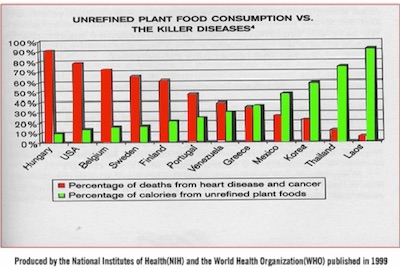
by plant4health | Apr 16, 2015 | cancer, Nutrition, Plant-based, Vegan, WFPB, Whole food, plant-based
Animal products (meat and dairy) promote cancer growth; plant foods prevent and can even reverse it. Regardless of your family history of cancer or other risk factors, you can significantly reduce the chance you will get it by adopting a 100% whole food, plant-based (WFPB) diet.
What is cancer?
Cancer, in which cells in your body mutate, divide and spread, goes through three stages: initiation, promotion and progression. Initiation happens when chemicals capable of causing cancer, called carcinogens, are processed by the liver, turning them from fat soluble to water soluble where they can be excreted from the body. But sometimes these chemicals escape the process and because they are highly reactive, damage molecules like DNA, RNA and protein. If the damaged DNA is not repaired by the body’s immune system, it is permanently changed, causing a mutation. Promotion is when clones of these mutated cells replicate and cluster together over the years. In the progression stage, these clusters, or pre-cancer cells, grow and become tumors. If the tumors invade other tissue or parts of the body, then the cancer has metastasized.
What causes cancer?
In addition to chemicals, there are many factors that can lead to cancer’s development at any of the 3 stages. These include certain viruses, excessive radiation (including from sunlight), nutritional imbalances, obesity, cigarette smoking, alcohol consumption, lack of physical exercise and stress.
Your genes (family history) are often implicated as a risk factor of cancer. However, according to a report published on the National Institutes of Health website, only 5-10% of cancer cases are due to family history, meaning that you are born with mutated genes. But many people suspect that it’s not your genes but how you were raised, the food you ate, the environment you grew up in, etc. that lead to certain cancers running in families. So the good news is that most cancer cases are due to environmental and lifestyle factors – things you can control.
We all have cancer cells that are initiated due to carcinogens, viruses, and lifestyle factors, but a strong immune system supported by proper nutrition can help control whether that cancer develops. Dr. T. Colin Campbell, co-author of The China Study and Whole, has stated that “nutritional imbalances are the most significant causes of cancer” and “…if we have genes that give rise to cancer, we can use nutrition to control the expression of these genes.”
The research:
Lab research conducted by Dr. Campbell showed that high doses of the animal protein casein, which is the primary protein in cow’s milk, promotes chemically induced liver cancer. Rats given a diet of 20% casein had their tumors grow, but when it was lowered to 5%, the tumors shrank. This finding is consistent with earlier research conducted by Indian scientists Madhavan TV, and Gopalan C. in “The effect of dietary protein on carcinogenesis of aflatoxin.” So it turns out that cow’s milk is a carcinogen for humans!
Other findings and experts back up these studies:
What can you do to reduce your cancer risk?
- Adopt a 100% WFPB diet
- Be physically active at least 30 minutes per day
- Maintain a healthy body weight
- Limit supplements, with the exception of Vitamin B12 for those on a 100% WFPB diet, or as recommended by your doctor
- Limit sugary foods and drinks and salty, processed foods
- Limit or avoid alcohol
Although there are no studies proving this, there are theories that “diet-induced acidosis may influence molecular activities at the cellular level that promote carcinogenesis or tumor progression.” See our articles on how to balance your pH.
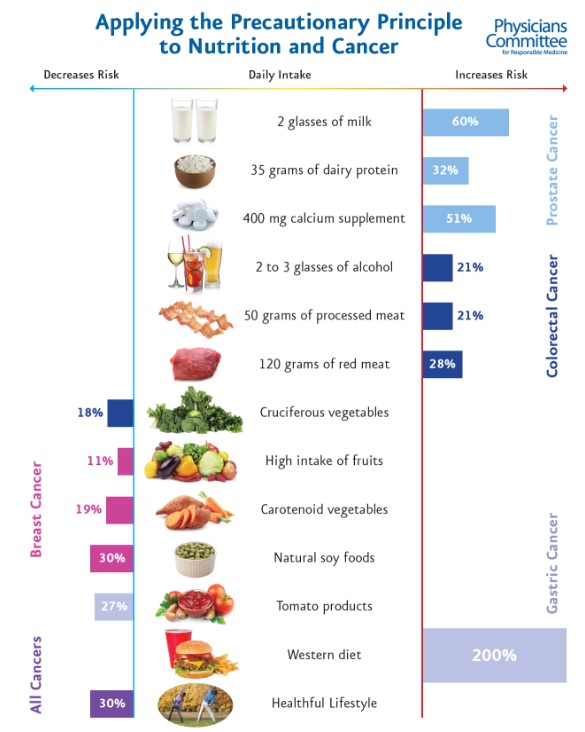 Here’s a link to a great chart published by PCRM about the benefits and risks of certain lifestyle choices and cancer.
Here’s a link to a great chart published by PCRM about the benefits and risks of certain lifestyle choices and cancer.
In summary, regardless of your family history of cancer or other risk factors, you can significantly reduce the chance you will get it by adopting a WFPB diet. You have the power to heal from within!
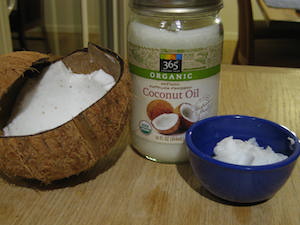
by plant4health | Apr 9, 2015 | Nutrition, Plant-based, WFPB, Whole food, Whole food, plant-based
 I’ve heard a lot of conflicting information about whether or not coconut oil is good for your heart. Yes, it’s true, approximately 90% of virgin coconut oil is saturated fat. This is alarming news among the health conscious because, if there is one thing we have been told over and over again it is, “saturated fat is associated with heart disease”.
I’ve heard a lot of conflicting information about whether or not coconut oil is good for your heart. Yes, it’s true, approximately 90% of virgin coconut oil is saturated fat. This is alarming news among the health conscious because, if there is one thing we have been told over and over again it is, “saturated fat is associated with heart disease”.
But before you throw out your coconut oil, it is important to carefully examine what we do know:
- Not all saturated fats are equal. A lot of media attention has been placed on research that suggests that saturated fats raise LDL (the bad cholesterol) and lead to heart disease, but their is a growing debate about whether this is really true. Not all saturated fats are the same, different kinds vary in chemical structure and their effects on your body and heart. Consequently, unrefined virgin coconut oil has a completely different biochemical makeup than saturated fat found in animal products; they are not comparable. Instead of consisting of the long-chain fatty acids found in meat and diary, unrefined virgin coconut oil is made up of medium-chain fatty acids that appear to have a more neutral effect on blood cholesterol. These fatty acids are more easily digested. In addition, because this type of fat is not easily stored in our body, it burns off as energy, making coconut oil popular among athletes as a way to boost endurance. In addition, most of coconut oil’s saturated fatty acid is lauric acid which current research suggests actually raises HDL (good cholesterol).
- Most studies regarding saturated fats do not look at the diet as a whole, instead, they attempt to isolate the dietary factors that potentially contribute to heart disease. But we all know that we do not eat nutrients in isolation. Whole foods consist of a complex mix of vitamins, minerals, fats, and sugar that interact in ways we have yet to understand. As a result, studying one isolated factor is not necessarily a predictor of the total experience. A study that pulls one element must be evaluated very carefully before claiming to hold the “whole truth”. The truth is; there are no long-term studies on the effect of unrefined coconut oil on the American diet and heart disease. This does not mean coconut oil is potentially bad, it only means that no money has been invested into researching this concept.
- Coconut oil is void of omega-3 fatty acids. In our Healing inflammation with food blog we briefly discussed the importance of balancing your omega-3 and omega-6 intake. Because coconut oil consists mostly of saturated fats, it is not a good source of omega-3s. The standard western American diet is out of balance in the omega-3/omega-6 ratio, this causes concern for those who consume large amounts of coconut oil as it can potentially offset this balance even further, leading to inflammation and creating an environment that supports disease. If you are adding coconut oil in your diet, it is important to also get your Omega-3s. Some great sources are flax, soy beans and walnuts.
- Not all coconut oil is alike. Beware of hydrogenated coconut oil. It has been stripped of most of the nutrients and contains unhealthy trans fats. I also recommend staying away from refined coconut oil, which is made from dried coconut. It has been bleached and deodorized through the use of high heat to remove its odor and flavor. Some brands have also been chemically treated to assist with the oil extraction process. Unrefined virgin coconut oil is the healthiest to consume. It has been extracted from the fruit of fresh mature coconuts without using high temperatures or chemicals. As a result, it retains its phytonutrients, fresh coconut scent and flavor. Learn more.
So… is coconut oil healthy or not? The lack of long-term studies that focus on the effects of unrefined coconut oil on heart health in relation to the American lifestyle leaves us guessing with only theories to guide us.
However, what we do know is that eating whole plant-based foods provides the natural balance of nutrients, that coconut oil is easier for our body to process then animal and hydrogenated fats, and that cultures that use coconut oil as the main source of dietary fat experience almost nonexistent cardiovascular disease.
Because the Western American diet is high in fat and processed foods, increasing your consumption of coconut oil without making any other dietary changes is not recommended. It is important to avoid over-consuming coconut oil simply because it has become the current “health food trend”. Coconut oil makes an excellent alternative for the unhealthy fats in your diet, but is best consumed in balance with your Omega-3s. It is also important to remember that it is not enough to simply add foods that are labeled as “healthy” to your diet, but to limit unhealthy foods that lack nutrients and promote a physiological environment that supports disease, such as processed foods and sugar, as well.
I cook with small amounts of coconut oil, feeling confident that it is a healthier alternative. However, I am careful not to add excessive amounts, knowing that balance in my diet is essential for optimal health.
Coconut Oil
Other Healing Uses that Provide Surprising Effects
Coconut oil promotes the healing of minor wounds. The antioxidants, collagen and antibacterial properties of coconut oil nourishes the skin and speeds healing. Gently message a small amount onto your minor cuts or scrapes or put a small drop on the Band-Aid before dressing the wound.
Coconut oil is great for your skin. Applying small amounts to your body helps strengthen underlying tissue to prevent wrinkles as it moisturizes. A little goes a long way, just apply enough to lightly coat the skin and massage thoroughly. It may feel greasy at first, but in a few minutes it will begin to be absorbed. Use daily.
Replace your shaving cream with coconut oil. Instead of soap or shaving foam, apply a thin layer to your legs (or for men, to your face) and then shave. The oil moisturizes while preventing razor burn and allows for a close shave.
Oil pulling with coconut oil is great for your oral health. Oil pulling has been used for thousands of years to improve oral health. Take a tablespoon of coconut oil and let it melt in your mouth. As it liquefies, gently swish it around your teeth for 10-20 minutes. I know this seems like a long time, but as you do this, the harmful bacteria are “pulled” from your teeth into the oil creating a milky white froth. After swishing, do not swallow the oil, but spit it out into the sink then brush your teeth. If done daily, you will notice shinier teeth, fresh breath, less sensitivity, and healthier gums and teeth.
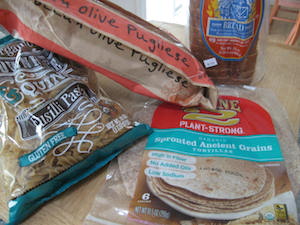
by plant4health | Mar 31, 2015 | Nutrition, Plant-based, Recipes, Vegan, WFPB, Whole food

Gluten-free has become a trendy buzzword among the health conscious. But is it right for everyone, even if you aren’t experiencing symptoms of having a gluten sensitivity?
What is gluten?
Gluten is a protein that naturally exists in wheat, rye, and barley and can be found in a variety of processed foods, including salad dressings and seasoning mixes. Gluten is also hiding in some vitamins, medications and makeup products. Gluten’s main claim to fame is its ability to help foods maintain its shape. That’s why it’s an essential part of baking. When combined with water, gluten’s strong, sticky protein gives structure to baked goods and pastas.
Gluten has become a popular meat substitute for vegans and vegetarians. High in protein, a four-ounce serving of seitan (a processed gluten meat substitute) contains about 26 grams of protein. Gluten is also low in fat and high in iron.(1)
When is gluten bad?
Gluten is harmful to people with celiac disease or a gluten sensitivity. When people with celiac disease (an autoimmune disorder) eat gluten it triggers an allergic reaction that results in inflammation and destruction to the lining of their small intestine and the malabsorption of nutrients. People with celiac disease tend to experience varying degrees of gastrointestinal issues, joint pain and skin rashes. In addition, studies have shown a link between celiac disease and neurological symptoms such as anxiety, depression, autism, epilepsy, and schizophrenia.(2) And there is strong evidence that individuals with autism, epilepsy, and schizophrenia all respond well to a gluten-free diet.(3) It only takes a very small amount of gluten (about 50 milligrams) to cause intestinal damage for a person with celiac disease. Learn more.
A related condition called gluten sensitivity or non-celiac gluten sensitivity can cause symptoms similar to celiac disease with an increase in the non-GI symptoms such as headaches, joint pain and numbness in the limbs and fingers. Individuals with gluten sensitivity lack the same antibodies as those with celiac disease and do not experience the same intestinal damage. Where celiac disease is considered an autoimmune disease, gluten sensitivity is an innate immune response where the immune system’s response does not target your own body’s tissues. (more…)
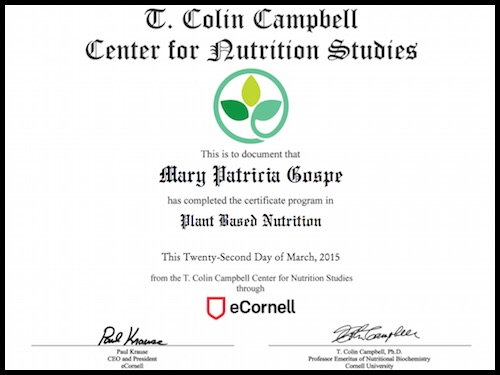
by plant4health | Mar 27, 2015 | Nutrition, Plant-based, WFPB, Whole food, plant-based
My sister-in-law, Kathy Parnay, and I co-founded Plant-based4health.com 3 months ago, in January 2015. Our goal was to share information on the benefits of a whole food plant-based (WFPB) diet. Her husband, Stefan, cured himself of aggressive prostate cancer on a low glycemic, alkalizing WFPB diet, so we had become believers in the healing power of food. I had already been a vegan since 2010 and a vegetarian for 18 years prior to that, so was eager to share tips and recipes with interested readers. Since that time, we have enjoyed a steady stream of global followers of our blog and “likes” on our Facebook page.
Wanting to learn more about plant-based nutrition to build my knowledge and credibility, I found the T. Colin Campbell Center for Nutrition Studies (CNS). CNS offers a six-week certification program in Plant-based Nutrition through Cornell’s online learning company, eCornell, so I quickly signed up.
I thoroughly enjoyed all the classes in the program. World-renowned experts Dr. T. Colin Campbell, Dr. Caldwell Esselstyn of The Cleveland Clinic and Dr. John McDougall of the McDougall Center and others deliver the lectures. Teacher’s Assistants (TAs) grade assignments, provide additional information and encourage discussion among the students. Topics include nutrition fundamentals, diseases of affluence (such as cancer, heart disease, Type 2 diabetes and more), understanding and interpreting scientific research, the role of supplements and the impact of food production on the environment. I am happy to report that I completed the classes and received my certificate this week!
More on Dr. Campbell and CNS:
T. Colin Campbell (M.S., Ph.D.) is the Jacob Gould Schurman Professor Emeritus of Nutritional Biochemistry in the Division of Nutritional Sciences at Cornell. He has spent his entire career studying the effects of nutrition on long-term health, conducting lab studies and large-scale human (epidemiological) studies. The co-author of the ground-breaking book, The China Study, along with Whole and Low Carb Fraud, his work was featured in the popular documentary Forks Over Knives.
I had the pleasure of interviewing Jenny Miller, Executive Director of CNS to learn more about the non-profit and the certification program. CNS was founded in 1997 by one of Dr. Campbell’s former students, Megan Murphy. The certificate program in plant-based nutrition offered through eCornell began in 2009. The program is one of the first offered and provides continuing medical education (CME) credits for health care professionals.
Over 6,000 students have completed the program with approximately 75% from the U.S. and the remaining in other countries, primarily Western Europe and Australia. Most students are heath care professionals, such as doctors, nurses and nutritionists, but there are many laypeople like myself – chefs, tech managers, accountants, etc. In the last year Ms. Miller has seen an increase in physicians and nurses taking the course, which she attributes to demand from patients.
CNS also launched a certification program called Nutrition for a Healthy Heart. Dr. Campbell’s son, and co-author of The China Study, Dr. Tom Campbell, just released a book called The Campbell Plan. His other son, Nelson Campbell, directed Plant Pure Nation, a documentary that will be released on July 4, 2015. Plant Pure Nation is currently running a Kickstarter campaign to raise money to get the documentary shown in as many venues as possible. Learn more and consider contributing.
In closing, it’s exciting to see that information on the health benefits of a WFPB lifestyle is gaining considerable attention among health care professionals and consumers. We are at a tipping point in changing the way people eat. A WFPB diet is healthier for us, healthier for our planet and better for the animals we no longer consume. Please join Kathy and me in spreading the word.

by plant4health | Mar 24, 2015 | Plant-based, Recipes, Vegan, WFPB, Whole food
 The nutritional power of everyday foods always amazes me. Perhaps because they are so readily available we overlook their healing capacity.
The nutritional power of everyday foods always amazes me. Perhaps because they are so readily available we overlook their healing capacity.
A common dipping tool for hummus and guacamole, a popular addition to salads and stews, the healing potential of carrots tends to be dismissed. In addition to containing many alkaline elements that assist your body in maintaining the acid-alkaline balance that is essential for optimal health, carrots have more than 490 phytochemicals. Each phytochemical provides different health benefits; some assist in detoxifying your body, others stimulate the immune system, modulate metabolism, and/or have antibacterial and antiviral qualities.
We all know about how the high amounts of the carotenoid beta-carotene found in carrots (that converts into vitamin A in our bodies) supports healthy vision, skin, and bones, but did you know that carrots are a great source of disease fighting flavonoids? These flavonoids provide antioxidants that work towards neutralizing free radicals that attack the cells of your body, protecting them from forming cancer cells, causing premature aging, and taxing your immune system.
Did you know that carrot juice is an effective diuretic? The combination of vitamins, minerals and antioxidants found in carrots promote detoxification and the elimination of excess water from your body.
But that’s not all. Below is a list of nutrients found in carrots. Raw or cooked, this vegetable holds a powerhouse of healing potential:  Below are some of the ways these nutrients play a vital role in your health, reducing your risk of chronic disease and cancer.
Below are some of the ways these nutrients play a vital role in your health, reducing your risk of chronic disease and cancer.
Heart Disease
The British Journal of Nutrition (Nov 2011) reported that consuming deep orange fruit and vegetables, especially carrots, may provide you with a 32% lower risk of coronary heart disease.
In addition, the antioxidants found in carrots work together synergistically to provide cardiovascular protective benefits. It is believed that obtaining any of these antioxidants in isolation from each other would not create the same effect. It is the nutrition from the whole food that provides the full health benefits.
The calcium found in carrots helps prevent the narrowing of blood vessels, the potassium promotes regular heartbeat, and the vitamin C protects cells against free radicals and strengthens blood vessel walls. Learn more here and here.
Cancer
Antioxidants in carrots, including vitamin C and beta-carotene, are known to play a significant role in cancer prevention; In 1986, a case-control study on the effect carrots and green vegetables have on lung cancer found that smokers who ate carrots more than once a week had a lower risk of lung cancer.
In 2011, a study investigated the effect of carrot juice extracts on leukemia and found evidence that carrot juice extract kills leukemia cells and inhibits their progression, making carrots an excellent source of bioactive chemicals to treat leukemia.
Fertility
According to the Harvard University School of Public Health (November 2013), eating foods rich in beta-carotene, like carrots, can boost male fertility, improving sperm motility by 6.5 – 8%.
Tips
Carrots are available in the grocery stores year-round. If you purchase your carrots at a farmers market with the greens attached, remove them before storing to prevent the greens from drawing out moisture and nutrients from the roots.
There are so many uses for carrots: shred them in salad and coleslaw, add them to wraps, steam or roast them for dinner, include them in muffins or cake to add a touch of sweetness, or juice them into a nutrient rich veggie drink.
Try one of these recipes:

by plant4health | Mar 18, 2015 | Nutrition, Plant-based, Vegan, WFPB, Whole food, plant-based
Happy Spring! March 20 is the first day of Spring and since 1985 International Meatout day! People from around the world celebrate the season by going vegan for the day. Why? A whole food, plant-based vegan diet is healthy for humans, the planet and animals.
Here are three reasons to take the meatout pledge: (more…)

 Here’s a link to a great chart published by PCRM about the benefits and risks of certain lifestyle choices and cancer.
Here’s a link to a great chart published by PCRM about the benefits and risks of certain lifestyle choices and cancer.





